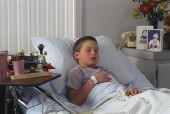
SUNDAY, May 2 (HealthDay News) — Many children with hepatitis C go undiagnosed and untreated, which can lead to severe liver damage later in life, a new study warns.
Researchers from the University of Miami Miller School of Medicine noted that national data shows that between 0.2 percent and 0.4 percent of children in the United States are infected with hepatitis C. Based on that data, they thought they would find about 12,155 cases of pediatric infection in Florida, yet only 1,755 cases were identified, a mere 14.4 percent of the expected number of cases.
“Our study showed a lack of adequate identification of hepatitis C virus infection in children that could be widespread throughout the nation,” said lead researcher Dr. Aymin Delgado-Borrego, a pediatric gastroenterologist and assistant professor of pediatrics.
Hepatitis C is like a “ticking bomb,” she said. “It seems harmless until it explodes.”
Most children and adults infected with hepatitis C do not have symptoms or only nonspecific symptoms, such as fatigue or abdominal pain, Delgado-Borrego said.
She planned to present the findings Sunday at the Digestive Disease Week conference in New Orleans.
Delgado-Borrego chose Florida for the study because it is one of the few states that requires all cases of the infection to be reported to the local health department.
“Not only was there a lack of proper identification, but among the children that have been identified the percentage of those receiving medical care is extremely and unacceptably low,” she said.
Based on these data, Delgado-Borrego’s group found only about 1.2 percent of children with hepatitis C were receiving treatment by a pediatric hepatologist.
Most young children get the infection from their mothers while in the womb. That accounts for about 60 percent of the infections in young children, Delgado-Borrego said. Teenagers can get it through IV drug use and other substance abuse, she added.
So why are so many kids missed? According to Delgado-Borrego, there’s a widespread lack of awareness of the condition and adequate screening is not often done. Moreover, children are too often not referred to treatment.
“Primary care doctors should screen all children who are at risk for hepatitis C infection, such as those whose mothers are infected,” Delgado-Borrego said.
In addition, infected children should be referred to specialists, she added.
“Early identification of pediatric hepatitis C infection would likely help us cure the infection in over 50 percent of children that currently have it,” Delgado-Borrego pointed out. “This would save children from liver damage as well as possible liver failure, liver cancer and even early death,” she added.
Dr. Marc Siegel, an associate professor of medicine at New York University, said that, “this is a pretty shocking study.”
Siegel said early diagnosis of hepatitis C is very important, especially in children. “Because if kids have it they have a lifetime of exposure to it, so the chances of damage to the liver is very high,” he explained.
Hepatitis C is the leading cause of liver transplantation, Siegel noted.
More information
For more information on hepatitis C, visit the U.S. National Institutes of Health.

